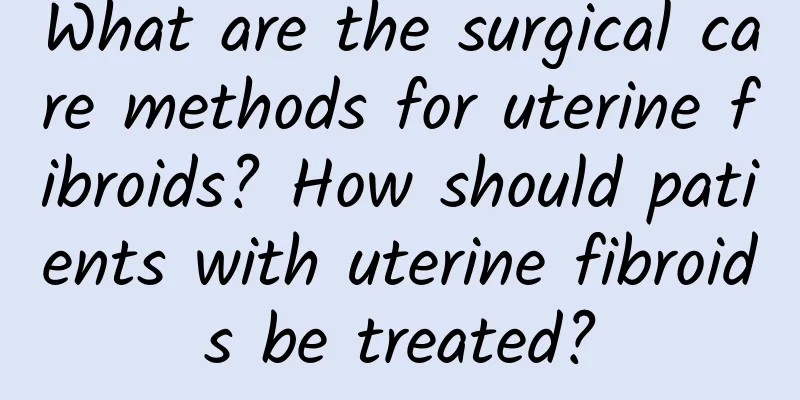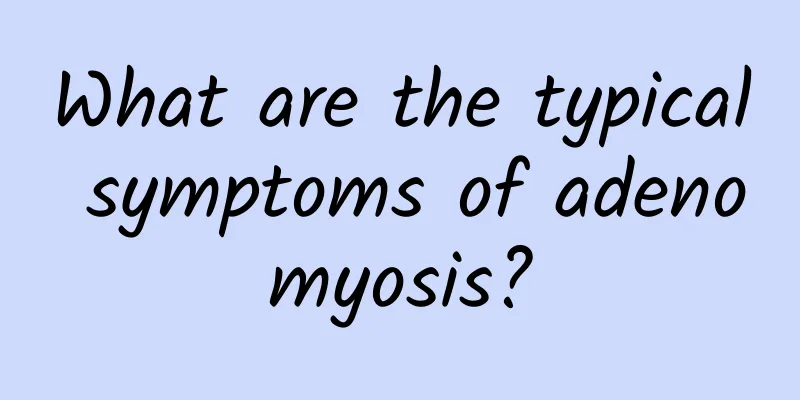What are the surgical care methods for uterine fibroids? How should patients with uterine fibroids be treated?

|
Uterine fibroids are prone to recurrence. If the postoperative care is not done properly, it is possible to get it again. Therefore, learning how to deal with the postoperative period is key. So what should be paid attention to in the surgical care of uterine fibroids? 1. Preoperative care: Psychological care: Explain to the patient the importance and precautions of surgical treatment, surgical treatment methods and anesthesia methods, and provide guidance based on the patient's different psychological reactions to eliminate the patient's fear of surgery and postoperative concerns. Preoperative preparation: Vaginal preparation before uterine fibroid surgery is crucial to prevent postoperative infection. The more thorough the preoperative vaginal preparation, the less chance of postoperative infection. 2. Postoperative care: Post-anesthesia care: After returning to the ward, the patient should lie flat on a pillow for 6 to 8 hours with the head tilted to one side to prevent vomitus from being inhaled into the trachea causing suffocation or aspiration pneumonia. Pay attention to observation to prevent accidents. Postoperative observation: After the patient returns to the ward, understand the anesthesia method and surgical conditions, closely observe vital signs, monitor blood oxygen saturation, measure normal blood pressure, respiration, pulse and body temperature every 30 minutes; pay attention to whether the wound dressing is dry, whether there is bleeding, oozing, vaginal bleeding and internal bleeding Body position: Take a semi-recumbent position 24 hours after surgery to relax the abdominal muscles, reduce incision tension, relieve wound pain, and facilitate incision healing. To prevent bleeding from the surgical site or internal bleeding, the time to get up can be appropriately extended after surgery to promote gastrointestinal peristalsis recovery and increase appetite. Pay attention to vaginal bleeding. Diet: A reasonable and appropriate diet after surgery can promote incision healing and physical recovery. When you cannot eat or eat insufficiently, you should supplement intravenously to prevent electrolyte disorders. |
Recommend
What is the reaction after ovarian cyst surgery?
What happens after ovarian cyst surgery? Ovarian ...
It is necessary to take timely treatment of vulvar leukoplakia
The incidence of vulvar leukoplakia in my country...
How to treat uterine fibroids better? Common treatment methods for uterine fibroids
Nowadays, women are also very concerned about the...
The environment is also the key cause of vaginitis
The incidence of vaginitis has been very high in ...
Other causes of pelvic inflammatory disease
As we all know, cervicitis is a very serious gyne...
How to treat early uterine fibroids? Is the incidence of early uterine fibroids high?
Uterine fibroids are very harmful to women, rangi...
Diagnosis and Differentiation of Ectopic Pregnancy
Diagnosis and Differentiation of Ectopic Pregnanc...
Analyze for you what are the symptoms of chronic adnexitis in women
Adnexitis is a common disease in life, and chroni...
Are the elderly unable to have sex? Follow the "4 Slow" principle and you can still enjoy it
As a doctor, I often hear elderly patients' c...
Skipping rope can relieve stress! Hu Yuwei overcomes his fear of skipping rope
Jumping rope has many benefits. It can increase h...
The most effective treatment for cervical erosion
Cervical erosion seriously affects women's he...
Comparison of the main causes of clinical pelvic inflammatory disease
The cause of pelvic inflammatory disease is relat...
Stick exercise for fat loss and body shaping? 4 Myths of Stick Exercise
Stick exercises are becoming popular. Many people...
What medicine to take for bacterial vaginosis
Bacterial vaginosis is a common gynecological pro...
What medicine to take to prevent miscarriage
What medicine should be taken to prevent miscarri...









